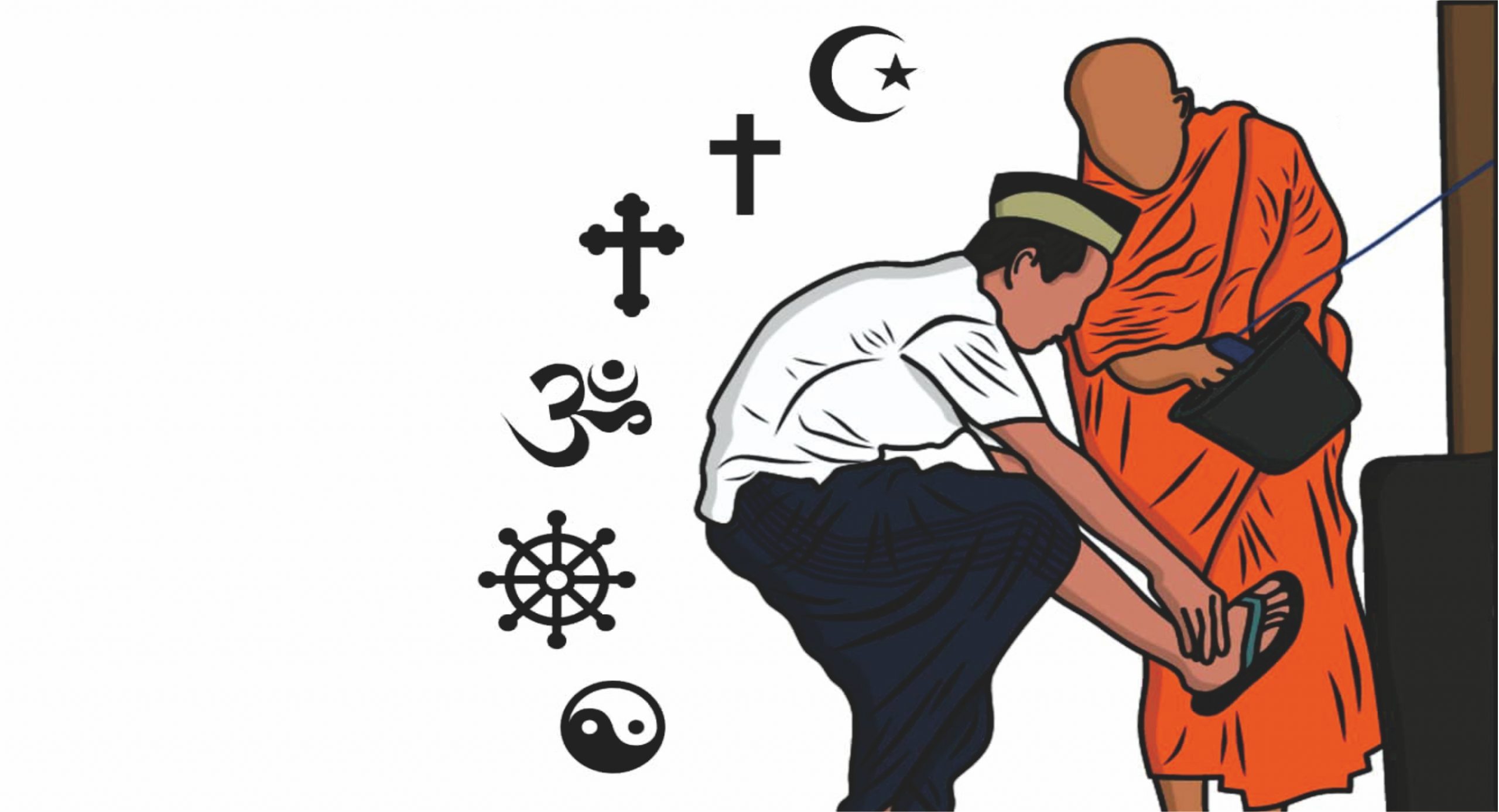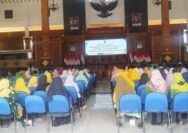Indonesia is an archipelagic state and one of the world’s great plural societies. People from various backgrounds live together in harmony. In the course of religious sphere, Indonesia officially recognizes six religions those are Islam, Protestantism, Catholicism, Hinduism, Buddhism, and Confucianism. As a nation, pluralistic society might be beneficial and constructive, contrarily, it could be negative and destructive. Accordingly, tolerance among adherents is highly needed to avoid disintegration and maintain peace upon religions in this disruption of modernization and globalization era.
Religion and faith have been extremely politicized and become sensitive subjects for some communities in Indonesia. Mistreated any issue can be easily provoking tensions and religion conflict as well. In fact, some communities are often fabricating social and political issue as a religions issue in purpose to gain collective interest and support from its adherents. This tremendous tensions among religions mainly derived from truth claim indoctrinated by religious authority to consider the others false and also based on the thought that the truth is only them (the fundamentalism or religious extremism), lack of understanding in pluralism ideology, and undefined boundary between faith and ethnicity.
From sociological perspective, Kasman Singodimejo summarized six factors why religion contribute to the violence; deficient in religious conception, negative fanaticism, unsuitable preaching audience and propaganda, the remnants of subversive communism movement, (v) injustice regime, and religiopolitical. Correspondingly, Muhammad Jusuf Kalla, the 10th and 12th Vice President of Indonesia addressed that social, political, and economic inequality are a root cause of the problem, whereas economic inequality is the main factor to cause religion conflict.
Historiography of religion conflict is commenced subsequently at the first experience and idea about religions itself, practically as old as each religions and also following the establishment of world’s societies. History tells us about holy war (bellum sacrum) the Crusades, Israeli-Palestinian conflict, the Syrian civil war, the wars in Afghanistan and Iraq, and the Rohingya conflict.
In regional scope, any attempt to accomplish or at least minimize religion conflict is fraught difficulty for Indonesia, the government often shows their incapability of managing diversity and pluralism in a proper way. This incapability to manage diversity and pluralism inflicted some unfortunate events, such as the Maluku Islands sectarian conflict, the Poso riots, the Sampit Conflict, the Sunni-Shia conflict in east java, and the case of Tolikara in Papua.
In multi perspectives, such conditions extremely would be detrimental to mankind in general, and the community as well as the state of Indonesia in particular. The worst impact of conflicts is the loss of the interfaith tolerance. Indeed, apathy and public ignorance toward this important issue will degrade and putrefy this great nation.
One of the most controversial and problematic issue cause to inter-religious tension or even religion conflict is Proselytism, both Islamization and Christianization. This article attempts to formulate an effective strategy to minimize inter-religious tension by interfaith dialogue and inter-religious organization interferences.
Proselytism as religious duty
Friederich Max Muller, German scholar of comparative language, religion, and mythology formed and distinguished world’s religions into two types, non-missionary religion like Judaism, Hinduism and Zoroaster, and missionary religion, like Christianity, Islam, and Buddhism. Another scholar, Thomas Patrick Burke rather to call it as universal religions.
That is to say self-understanding of being universal to all men, this type of religion aims to embrace all of mankind and actively desire converts. According to him, Buddhism, Christianity, and Islam are included to this universal religions type. On the other hand, another religions perceived themselves as exiting only for particular people, tribe, or nation, and do not desire converts. Thomas Patrick Burke mentioned it as communal, tribal, ethnic, or national religions, Judaism and Hinduism are examples.
In Christianity, public preaching of the Christian gospel with the intention of spreading the messages and teachings of Jesus Christ commonly known as mission or evangelism. Donal Dorr Catholic theologians, explained that the word mission and missionaries had a narrow sense and used to be misinterpreted, while the term evangelism as a replacement for the word mission has a broader meaning, which includes not only to convert others but about spreading religious messages and bringing the good news and revelation to humanity. In case, some traditionalist considers evangelism as a way of seeking to convert others.
The Biblical commands to evangelize is in Matthew 28:18-20 and Acts 1-8. In both passages God commands His followers to “Go…make disciples off all nations” (Matt. 28:19) and to witness to Him “to the ends of the earth” (Acts 1:8). For Christian, these two passages in Matthew is known universally as “The Great Commission” and has been viewed as an imperative to evangelism.
In Islamic tradition, the term mission and evangelism conceptually similar to the word dawah. Dawah might be targeted either at Moslem or non Moslem groups and its objectives is to covert others. Related to this topic, Imam Mohamed Magid gave his perspective and remarked that generally Moslem believe the conversion is decision that people make, Moslem do not convert people but they make the decision on their own. Later he stated “the right term to be used for this is ‘invitation,’ or sharing faith with others”. As God All Mighty says in the Quran 41:33, “Who is better in speech than one who calls people to Allah, works righteousness, and says, ‘I am of those who bow in Islam’?”.
According to him, the term dawah literally means to invite someone to something, in this case is faith of Islam. In the Quran 33:45-46, God All Mighty refers to the Prophet Muhammed (peace be upon him) as a “one who invites”. Furthermore, he elaborated three principles that governs the invitation as discussed below: 1) you do not belittle another person’s beliefs, but you represent your own in a market of ideas; 2) a person should not force others to the religion as the Quran teaches “there is no compulsion in religion”; and 3) use wisdom to know what to say and how and when to say it. The Quran also says, “God says call to the way of your lord with wisdom and beautiful teaching and engage them in dialogue in the best manner” (16:125).
In the last few years, the social structure of Indonesian societies have been in a worrying circumstances. Inter-religions relationships in Indonesia, particularly IslamChristianity, has long been a suspicion issue to another adherents. For Moslems, Christianization is perceived as a threat to the future world of modern Islam. On one hand, Christians are afraid of Islamization of public policies, and perceived it as a threat as well.
Both Islamization and Christianization can precipitate tension as intense, especially for Islamist and Christian conservative communities. This tension so often turn out to be violence and anarchism outcomes. In fact, Proselytism is mixed to another various issues such as, banning activities in a worship house, construction planning of new worship house, social aid, education, and marriage.
As indicated above, there have been some instances of proselytism issues in Indonesia. The first one comes from The Sydney Morning Herald News Paper in Mei 2013 and March 2014, they wrote Indonesian government were allowing illegal activities which is done by As-Syafi’iyah an Islamic boarding school in Jakarta. They accused that Christian orphans were being taken from West Papua, schooled them in Islamic school and converted to Islam. The second narration comes from the post-earthquake Christianization rumor in Lombok in august 2018. This rumor spread massively throughout various mass media. Causing panic for sure and provoking inter-religious tension intensively.
Proselytism in Human Right Law
In general, proselytism is realized as activities by all means to religious spreading, and have an intention of inviting others to make convert. In Indonesian constitution, the right to proselytize have been covered in Article 29 Section number 2 the 1945 Constitution of the Republic of Indonesia, which is “The state guarantees each and every citizen the freedom of religion and of worship in accordance with his religion and belief.” In his article Alamsyah M. Djafar stated his believe that proselytism is part of “worship” itself and manifestation of each religions. Later on, the right to proselytize is also mentioned in Article 22 Section 1 and 2 the Law Number 39 year 1999 about Human Right.
International Human Right recognize the right to the freedom of religion, in the manner of freedom to hold religious beliefs and freedom to manifest those beliefs whether in private or public sphere to worship, observance, practice and teaching. As Article 18 Section 1 of the International Covenant of Civil and Political Right (ICCPR) provided. The UN Declaration on Elimination of All Forms of Intolerance and of discrimination Based on Religion or Belief (1981) also guarantees the freedom of religion, provided in Article 6 (d) and (e), “The right to freedom of thought, conscience, religion or belief includes the freedom, ‘to write, issue and disseminate relevant publications in these area’ (d) and ‘to teach a religion or belief in place suitable for these purpose’ (e)”.
It is decidedly difficult for Indonesian societies to accept proselytism as part of freedom of religion. Although, proselytism is a legal activity both in domestic and international law, as long as it done in a proper way. Hence, Islamization and Christianization can’t be considered as a violation to others freedom of religion and belief.
Proper and Improper Proselytism
In proselytize process, is often found practices that are considered as unconventional, unethical, even illegal. For examples, coercion and violence to force others to make conversion, coercion to children, and proselytism in exceptional circumstances as if disaster. In considering the line between proper and improper proselytism is obviously depends on various factors.
Ted Stahnke emphasized interrelated factors that determines whether particular activities are proper or improper proselytism. They are, the attribute of the sources, the attribute of the target, where the action alleged to be improper proselytism take place, and the nature of the action. In this point, he stated that “the most significant factor in the separation of improper from proper proselytism is the nature of the action.” He proposed that the bare communication of religious beliefs between inter-adherent is generally not considered to be improper proselytism, while the potential for coercion lies in the nature of the exchange (thought in religion), and conversion or change in beliefs trough violence or threat of violence is completely improper proselytism.
From government’s perspective, proper and improper proselytism can be seen as in The Ministerial Joint Decree of the Minister of Religion and Minister of Home Affairs Number 1 Year 1979 about Religious Broadcasting Implementation Procedures and Foreign Aid to Religious Institution in Indonesia. In this decree, religious broadcasting is interpreted as all activities that has an objective to propagate religious belief and teaching. Furthermore, this decree regulates certain way that recognized as a prohibited religious broadcasting. They are 1) use persuasion by giving foods, money, clothing, treatment, medicine, and any kind of bribe that is intended to convert others, 2) spreading pamphlets, magazines, bulletins, books, and forms of other molds to people or groups who have adhered to other religions, and 3) preaching from house to house of people who adhered to other religions.
Contribution to Reduce Inter-Religious Tension
Hans Kung, in his book “Global Responsibility” he noted “No human life together without a world ethic for the nation. No peace among the nations without peace among the religion. No peace among the religions without dialogue among religions.” From these word he clearly shows us about the necessity of inter-religions dialogue.
Inter-religion dialogue, also known as interfaith dialogue, is a conversation between believers (adherents) of different faiths or religious traditions. Interfaith dialogue has been seen as a removing tool for historical prejudices and enmities, develops the possibilities for working together for common good among religions, and leads religious adherents to an open way of life that they may arrive on the concept of “unity in diversity” and “to live together” based on theological pluralism. Interfaith dialogue is also believed to avoid religious fundamentalism and communalism, to understand ones own religion better, it helps mutual enrichment, it removes misunderstanding and misconceptions, create respect for another religion, necessary for mutual criticism and growth, develops pluralistic perspective, and many more.
In this temporary world, interfaith dialogue is more suitable for prevention and post inter-religious tension. In the middle of the tension, is part of religious authority and inter-religious organization which is contained pluralistic and tolerance adherents from each religions to take control the situation.





